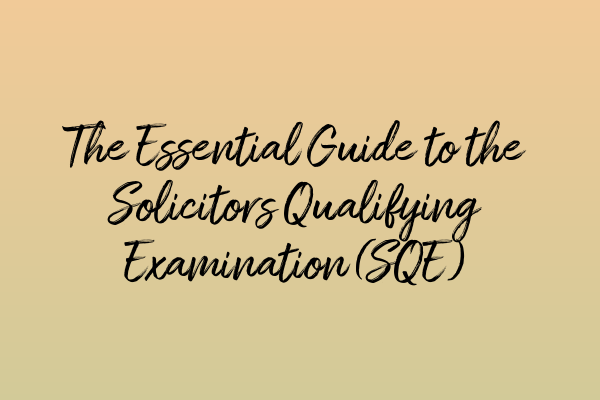The Essential Guide to the Solicitors Qualifying Examination (SQE)
Welcome to our comprehensive guide on the Solicitors Qualifying Examination (SQE). Whether you’re a law graduate aspiring to become a solicitor or an experienced legal professional looking to qualify, this guide will provide you with all the essential information you need to know about the SQE.
What is the SQE?
The Solicitors Qualifying Examination (SQE) is a new standardized assessment that will replace the current system of qualification for solicitors in England and Wales. It is designed to ensure that all aspiring solicitors have the necessary knowledge and skills to practice law effectively.
Why was the SQE introduced?
The introduction of the SQE aims to bring greater consistency and transparency to the qualification process for solicitors. It will ensure that all candidates are assessed on a level playing field, regardless of their educational background or training route.
Key features of the SQE
1. Structure:
– The SQE consists of two stages: SQE1 and SQE2.
– SQE1 assesses candidates’ knowledge of the law and legal practice.
– SQE2 assesses candidates’ practical legal skills.
2. Assessment Methods:
– SQE1 is a computer-based, multiple-choice exam.
– SQE2 includes a range of practical assessments, such as client interviewing, advocacy, legal research, and case analysis.
3. Content:
– SQE1 covers legal principles, contract law, criminal law, and much more.
– SQE2 tests candidates’ skills in areas like legal drafting, advocacy, and client care.
4. Qualifying Work Experience (QWE):
– QWE is a mandatory component of the SQE.
– Candidates must complete two years of qualifying work experience before they can qualify as a solicitor.
– QWE can be gained in a variety of legal environments, including law firms, in-house legal departments, and even non-lawyer roles in legal organizations.
Preparing for the SQE
Now that you have a general understanding of the SQE, let’s discuss how you can effectively prepare for the examination.
1. Start early:
– The SQE is a rigorous assessment that requires thorough preparation.
– Begin your studies well in advance to allow sufficient time to cover all the necessary topics.
2. Develop a study plan:
– Create a detailed study plan and stick to it.
– Break down the syllabus into manageable chunks and allocate specific study time to each topic.
3. Use reliable study materials:
– Choose reputable study materials that cover all the required areas for the SQE.
– Make use of textbooks, online resources, and practice papers to solidify your understanding.
4. Take mock exams:
– Practice under exam conditions by taking mock exams.
– This will help you familiarize yourself with the format and time constraints of the SQE.
5. Seek professional guidance:
– Consider enrolling in SQE preparation courses or seeking guidance from experienced solicitors.
– Their expertise can provide valuable insights and strategies to enhance your preparation.
The Benefits of Qualifying through the SQE
Qualifying through the SQE offers several benefits for aspiring solicitors:
1. Flexibility:
– The SQE provides flexibility in terms of study options, allowing candidates to choose their preferred training provider and study at their own pace.
2. Greater Accessibility:
– The SQE aims to open up pathways to the legal profession for a wider range of individuals by removing some of the traditional barriers to entry.
3. Enhanced Skills Development:
– The SQE’s focus on practical skills development ensures that candidates are not only knowledgeable about the law but also equipped with the necessary abilities to practice effectively.
4. Professional Recognition:
– Qualifying through the SQE will earn you the same professional recognition as those who qualify through the current route.
Conclusion
The Solicitors Qualifying Examination (SQE) is set to revolutionize the qualification process for solicitors in England and Wales. With its standardized assessment structure and focus on practical skills, the SQE aims to produce highly competent solicitors who can effectively serve their clients.
Are you interested in learning more about different aspects of criminal law? Check out our related articles:
– Private Prosecutions: Exploring Non-Governmental Prosecutions in Criminal Cases
– Ethical Challenges in Criminal Defence: Navigating Dilemmas
– Understanding Drug-related Offences: Laws and Penalties in the UK
– Magistrates’ Court vs Crown Court: Different Paths in Criminal Proceedings
– Criminal Defence Strategies: Expert Approaches to Protecting Clients’ Interests
If you have any further questions about the SQE or need guidance on your journey to become a solicitor, don’t hesitate to get in touch with us at [Your Law Firm Name]. Our experienced solicitors are here to support and assist you every step of the way.


Leave a Reply